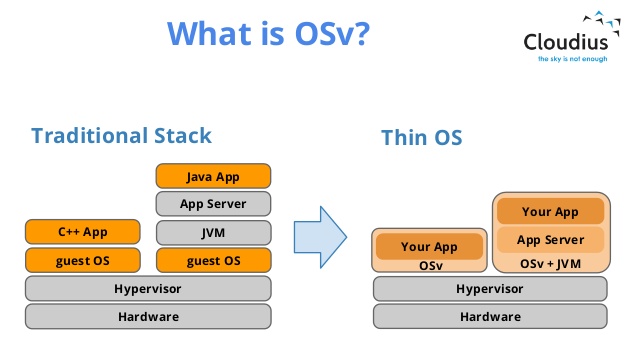
Cloud-based virtual machines are proliferating like mad, so it’s about time there was an operating system for them.
Created by Cloudius Systems, OSv is a new open-source operating system for virtual machines, designed to execute a single application atop a hypervisor. Written in C/C++, the cloud OS runs Linux applications on hypervisors such as VMware and Xen, and on virtual machines and cloud environments such as Amazon, Google Compute Engine, and Joyent’s SmartOS.
“Operating systems have evolved over decades to perform two distinct functions: manage the hardware, and provide isolation between the multiple applications and users running on the system,” according to the OSv FAQ.
“However, in modern deployments, the hardware is virtualized, so there is very little for the operating system to manage. In addition, common deployment scenarios have one application per server, leaving the isolation capabilities of the OS unutilized. In short, modern practice has turned the traditional operating system to pure bloat. OSv recognizes this and rebuilds the operating system for the modern era.”
OSv has APIs for new applications, and it also runs unmodified Linux applications and unmodified JVMs. In addition to Java, the OS supports runtime languages such as JavaScript, Ruby and Scala, with PHP and Python runtime support planned for future releases.
Rather than utilize Docker containers, the cloud OS uses a custom tool called Capstan for rapid VM builds of complete VM images running in any hypervisor on OSv. A private beta of OSv has recently opened, and more information is available on the OSv project site.
Top 5 projects trending on GitHub
#1: The F**k, a self-described “magnificent app” that corrects previous console commands, designed to match rules for previous commands, create new commands using the matched rules, and run them.
#2: Dragula, the most fearsomely simple drag-and-drop tool in all of Dragsylvania. Bleh bleh!
#3: Elevator.js, a “back-to-top” webpage button that behaves like an elevator, adding elevator music as a user smoothly scrolls back to the top of the screen. Give it a whirl.
#4: Sprint.js is a high-performance DOM library for modern browsers with a familiar, jQuery-like chainable API focused on bandwidth and resource-constrained mobile devices and tablets.
#5: Layzr.js: a small, fast, dependency-free library for lazy loading of Web pages.






